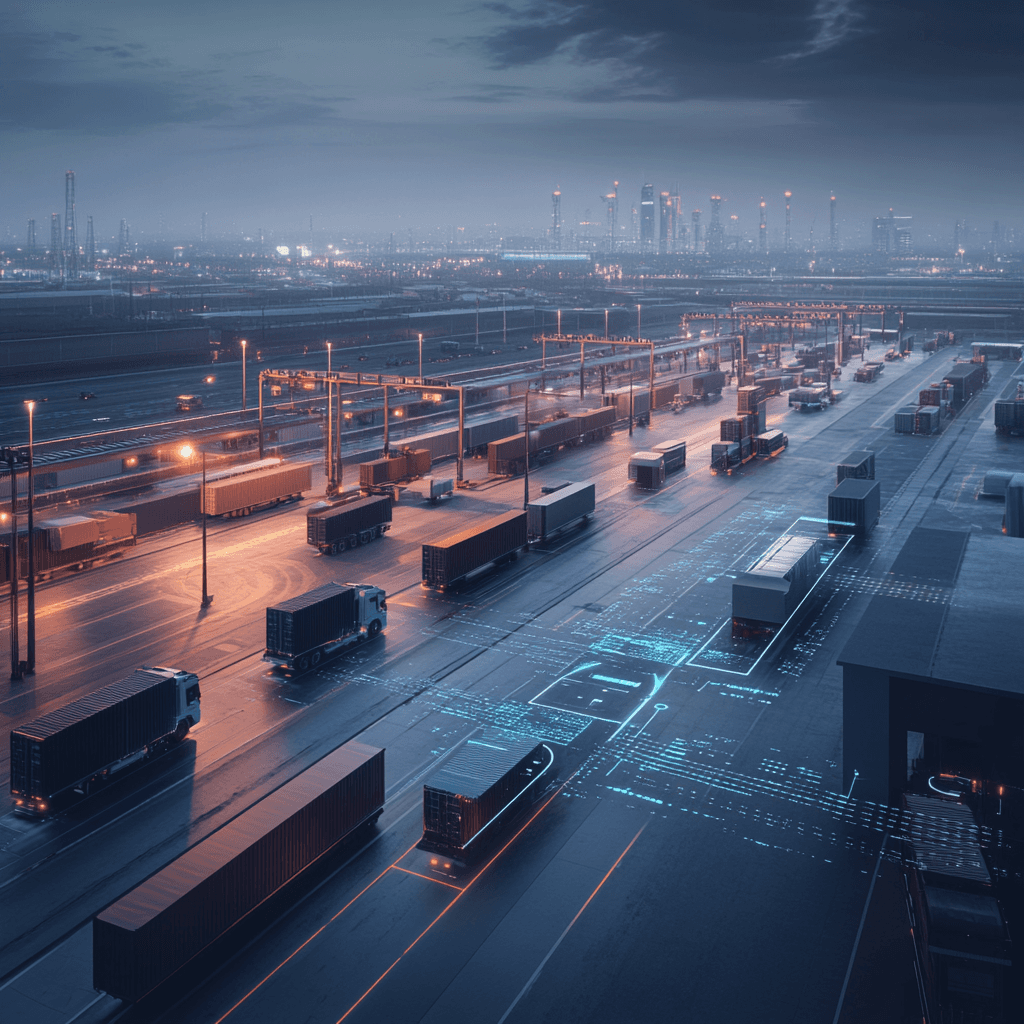
Insights
December 6, 2024
Revolutionizing Air Cargo: How AI is Transforming Freight Management

Insights
December 6, 2024
Revolutionizing Air Cargo: How AI is Transforming Freight Management
Explore how artificial intelligence is disrupting the air cargo industry by driving efficiency, reducing costs, and enabling smarter freight management systems that cater to the growing demands of global trade. This in-depth article dives into the ways AI is shaping the future of air logistics, including demand forecasting, route optimization, and operational automation.
Revolutionizing Air Cargo: How AI is Transforming Freight Management
The air cargo industry stands as a vital cog in the global economy, driving speed and efficiency in international trade. As globalization continues to expand access to markets across the world, the demand for faster and more reliable freight transport has skyrocketed. However, traditional air cargo systems are straining under the weight of rising volumes, inefficient processes, and unforeseen disruptions. Enter artificial intelligence. By introducing unprecedented levels of intelligence, accuracy, and adaptability, AI is transforming the landscape of air freight management in ways never imagined before. From optimizing operational efficiency to ensuring cost-effectiveness and sustainability, AI is not just an add-on to air freight operations; it is becoming the backbone of a new era in global logistics.
Many challenges have historically plagued air cargo management. Delays in deliveries, inefficient flight route planning, limited forecasting abilities, and operational bottlenecks have often plagued air freight operators. Global disruptions, such as the COVID-19 pandemic and supply chain crises, revealed just how fragile traditional freight management approaches can be. In response, more and more businesses in the logistics sector are turning to artificial intelligence to create robust, resilient, and highly efficient systems for managing cargo. The integration of AI into air cargo operations has enabled businesses not just to meet evolving demands but to anticipate them.
AI is a game changer for demand forecasting in the air cargo industry. Traditionally, freight operators have relied on historical data and limited analytics to predict demand for air cargo transportation. The results are often inaccurate, leading to issues like underutilization of cargo space or overbooking, which increase operational costs. AI-powered demand forecasting tools, on the other hand, are changing the game. By analyzing large datasets from various sources, including weather patterns, trade statistics, consumer behavior, and geopolitical factors, AI can predict demand with breathtaking accuracy. Forward-thinking logistics companies are now using machine learning algorithms to anticipate surges or lulls in cargo demand, allowing them to better allocate resources and optimize operations.
Another critical area where AI shines is route optimization. Efficient route planning is fundamental to the success of air cargo operations. Incorrect flight paths, inefficient ground handling, and logistical mismanagement can lead to delays, higher costs, and increased carbon emissions. AI algorithms excel at analyzing multiple variables in real time, providing insights into the most efficient routes for cargo flights. Factors such as air traffic, weather conditions, fuel costs, and delivery timelines are considered to offer a comprehensive strategy that minimizes inefficiencies. Some operators have already reported significant cost savings and emissions reductions thanks to these optimized routes.
Automation is another facet of AI that is transforming air cargo operations. Automatic decision-making systems powered by AI are increasingly replacing the manual, time-consuming processes that were once dominant in freight management. Air cargo hubs equipped with AI-driven robotics, smart conveyors, and automated cargo loaders are significantly increasing operational speeds and reducing human error. Additionally, predictive maintenance systems are being employed to monitor the condition of cargo-handling equipment and aircraft. These systems can flag potential issues before they escalate into costly repairs or operational downtime, further improving the overall efficiency of the supply chain.
One of AI’s most exciting implementations in air freight management is its ability to enhance cargo tracking and monitoring. Customers expect end-to-end visibility when shipping goods across the world, and AI has enabled businesses to meet this expectation seamlessly. Advanced tracking systems leverage AI to provide real-time updates on the location and condition of shipments. This technology ensures the safety of perishable items, high-value cargo, or goods requiring stringent temperature controls during transit. For instance, data-driven insights can alert operators when a shipment is at risk of temperature deviation, enabling immediate corrective action to prevent spoilage or damage.
AI’s role in air cargo also intersects with risk and disruption management. Unexpected weather changes, geopolitical tensions, or supply chain interruptions have the potential to wreak havoc on air freight operations. Machine learning models can simulate complex scenarios, enabling operators to predict vulnerabilities and formulate contingency plans even before disruptions occur. AI also aids in faster recovery when incidents happen, helping businesses to minimize losses and maintain customer satisfaction.
As exciting as the possibilities are, the integration of AI into air cargo doesn’t come without challenges. Implementing advanced AI systems often requires sizable upfront investment, something not all industry players are equipped for. Moreover, the complexity of these systems necessitates specialized training for personnel, creating a steep learning curve. Given the critical nature of air cargo in the global supply chain, potential cybersecurity threats to AI-driven systems are also a pressing concern. Transparent regulation, robust cybersecurity measures, and partnerships between technology providers and freight operators will be key to overcoming these challenges.
Despite these hurdles, the momentum toward AI-driven air freight management is unstoppable. Leading industry players like DHL, FedEx, and UPS are already leveraging AI to expand their operational prowess. Startups focused on developing AI solutions specific to logistics are also making waves, offering scalable, customizable technologies that cater to businesses of all sizes. Meanwhile, governments and policymakers are beginning to understand the potential of AI in creating more resilient and sustainable air cargo networks, ushering in a new era of public-private partnerships to accelerate adoption.
Beyond operational efficiency, the sustainability potential of AI in air cargo is especially noteworthy. The global logistics sector is under increasing scrutiny to reduce its carbon footprint, and air cargo is one of the most energy-intensive forms of transport. AI-driven systems can calculate fuel-efficient routes, optimize cargo space to avoid waste, and predict the best times for takeoffs and landings to minimize idling on the tarmac. These innovations are contributing to significant reductions in energy consumption and greenhouse gas emissions, positioning AI as a key enabler of greener skies.
The air cargo industry’s embrace of AI is not just a trend; it is a paradigm shift. The incorporation of machine learning, predictive analytics, automation, and other AI technologies is helping operators achieve a level of efficiency, resilience, and sustainability that would have been considered science fiction just a few decades ago. For transportation experts, supply chain managers, and executives, the choice is clear: adapt to these technological advancements or risk falling behind.
As we peer into the future, it’s clear that this is just the beginning of AI’s impact on air cargo. Advancements in complementary technologies like blockchain and IoT are poised to further enhance the potential of AI in freight management. Together, these innovations will create a more interconnected, transparent, and intelligent global supply chain. For stakeholders in the air cargo ecosystem, understanding and adopting these technologies will be essential to staying competitive in this rapidly evolving industry.
In conclusion, artificial intelligence is rewriting the rulebook for air cargo. Its ability to solve long-standing challenges while opening new opportunities makes it a crucial tool for the future of freight management. From demand forecasting and route optimization to automation and sustainability, AI offers a transformative solution for the challenges facing today’s air cargo operators. For transportation and supply chain professionals, the message is clear: the time to embrace AI isn’t tomorrow; it’s now.
Revolutionizing Air Cargo: How AI is Transforming Freight Management
The air cargo industry stands as a vital cog in the global economy, driving speed and efficiency in international trade. As globalization continues to expand access to markets across the world, the demand for faster and more reliable freight transport has skyrocketed. However, traditional air cargo systems are straining under the weight of rising volumes, inefficient processes, and unforeseen disruptions. Enter artificial intelligence. By introducing unprecedented levels of intelligence, accuracy, and adaptability, AI is transforming the landscape of air freight management in ways never imagined before. From optimizing operational efficiency to ensuring cost-effectiveness and sustainability, AI is not just an add-on to air freight operations; it is becoming the backbone of a new era in global logistics.
Many challenges have historically plagued air cargo management. Delays in deliveries, inefficient flight route planning, limited forecasting abilities, and operational bottlenecks have often plagued air freight operators. Global disruptions, such as the COVID-19 pandemic and supply chain crises, revealed just how fragile traditional freight management approaches can be. In response, more and more businesses in the logistics sector are turning to artificial intelligence to create robust, resilient, and highly efficient systems for managing cargo. The integration of AI into air cargo operations has enabled businesses not just to meet evolving demands but to anticipate them.
AI is a game changer for demand forecasting in the air cargo industry. Traditionally, freight operators have relied on historical data and limited analytics to predict demand for air cargo transportation. The results are often inaccurate, leading to issues like underutilization of cargo space or overbooking, which increase operational costs. AI-powered demand forecasting tools, on the other hand, are changing the game. By analyzing large datasets from various sources, including weather patterns, trade statistics, consumer behavior, and geopolitical factors, AI can predict demand with breathtaking accuracy. Forward-thinking logistics companies are now using machine learning algorithms to anticipate surges or lulls in cargo demand, allowing them to better allocate resources and optimize operations.
Another critical area where AI shines is route optimization. Efficient route planning is fundamental to the success of air cargo operations. Incorrect flight paths, inefficient ground handling, and logistical mismanagement can lead to delays, higher costs, and increased carbon emissions. AI algorithms excel at analyzing multiple variables in real time, providing insights into the most efficient routes for cargo flights. Factors such as air traffic, weather conditions, fuel costs, and delivery timelines are considered to offer a comprehensive strategy that minimizes inefficiencies. Some operators have already reported significant cost savings and emissions reductions thanks to these optimized routes.
Automation is another facet of AI that is transforming air cargo operations. Automatic decision-making systems powered by AI are increasingly replacing the manual, time-consuming processes that were once dominant in freight management. Air cargo hubs equipped with AI-driven robotics, smart conveyors, and automated cargo loaders are significantly increasing operational speeds and reducing human error. Additionally, predictive maintenance systems are being employed to monitor the condition of cargo-handling equipment and aircraft. These systems can flag potential issues before they escalate into costly repairs or operational downtime, further improving the overall efficiency of the supply chain.
One of AI’s most exciting implementations in air freight management is its ability to enhance cargo tracking and monitoring. Customers expect end-to-end visibility when shipping goods across the world, and AI has enabled businesses to meet this expectation seamlessly. Advanced tracking systems leverage AI to provide real-time updates on the location and condition of shipments. This technology ensures the safety of perishable items, high-value cargo, or goods requiring stringent temperature controls during transit. For instance, data-driven insights can alert operators when a shipment is at risk of temperature deviation, enabling immediate corrective action to prevent spoilage or damage.
AI’s role in air cargo also intersects with risk and disruption management. Unexpected weather changes, geopolitical tensions, or supply chain interruptions have the potential to wreak havoc on air freight operations. Machine learning models can simulate complex scenarios, enabling operators to predict vulnerabilities and formulate contingency plans even before disruptions occur. AI also aids in faster recovery when incidents happen, helping businesses to minimize losses and maintain customer satisfaction.
As exciting as the possibilities are, the integration of AI into air cargo doesn’t come without challenges. Implementing advanced AI systems often requires sizable upfront investment, something not all industry players are equipped for. Moreover, the complexity of these systems necessitates specialized training for personnel, creating a steep learning curve. Given the critical nature of air cargo in the global supply chain, potential cybersecurity threats to AI-driven systems are also a pressing concern. Transparent regulation, robust cybersecurity measures, and partnerships between technology providers and freight operators will be key to overcoming these challenges.
Despite these hurdles, the momentum toward AI-driven air freight management is unstoppable. Leading industry players like DHL, FedEx, and UPS are already leveraging AI to expand their operational prowess. Startups focused on developing AI solutions specific to logistics are also making waves, offering scalable, customizable technologies that cater to businesses of all sizes. Meanwhile, governments and policymakers are beginning to understand the potential of AI in creating more resilient and sustainable air cargo networks, ushering in a new era of public-private partnerships to accelerate adoption.
Beyond operational efficiency, the sustainability potential of AI in air cargo is especially noteworthy. The global logistics sector is under increasing scrutiny to reduce its carbon footprint, and air cargo is one of the most energy-intensive forms of transport. AI-driven systems can calculate fuel-efficient routes, optimize cargo space to avoid waste, and predict the best times for takeoffs and landings to minimize idling on the tarmac. These innovations are contributing to significant reductions in energy consumption and greenhouse gas emissions, positioning AI as a key enabler of greener skies.
The air cargo industry’s embrace of AI is not just a trend; it is a paradigm shift. The incorporation of machine learning, predictive analytics, automation, and other AI technologies is helping operators achieve a level of efficiency, resilience, and sustainability that would have been considered science fiction just a few decades ago. For transportation experts, supply chain managers, and executives, the choice is clear: adapt to these technological advancements or risk falling behind.
As we peer into the future, it’s clear that this is just the beginning of AI’s impact on air cargo. Advancements in complementary technologies like blockchain and IoT are poised to further enhance the potential of AI in freight management. Together, these innovations will create a more interconnected, transparent, and intelligent global supply chain. For stakeholders in the air cargo ecosystem, understanding and adopting these technologies will be essential to staying competitive in this rapidly evolving industry.
In conclusion, artificial intelligence is rewriting the rulebook for air cargo. Its ability to solve long-standing challenges while opening new opportunities makes it a crucial tool for the future of freight management. From demand forecasting and route optimization to automation and sustainability, AI offers a transformative solution for the challenges facing today’s air cargo operators. For transportation and supply chain professionals, the message is clear: the time to embrace AI isn’t tomorrow; it’s now.
Explore how artificial intelligence is disrupting the air cargo industry by driving efficiency, reducing costs, and enabling smarter freight management systems that cater to the growing demands of global trade. This in-depth article dives into the ways AI is shaping the future of air logistics, including demand forecasting, route optimization, and operational automation.
Revolutionizing Air Cargo: How AI is Transforming Freight Management
The air cargo industry stands as a vital cog in the global economy, driving speed and efficiency in international trade. As globalization continues to expand access to markets across the world, the demand for faster and more reliable freight transport has skyrocketed. However, traditional air cargo systems are straining under the weight of rising volumes, inefficient processes, and unforeseen disruptions. Enter artificial intelligence. By introducing unprecedented levels of intelligence, accuracy, and adaptability, AI is transforming the landscape of air freight management in ways never imagined before. From optimizing operational efficiency to ensuring cost-effectiveness and sustainability, AI is not just an add-on to air freight operations; it is becoming the backbone of a new era in global logistics.
Many challenges have historically plagued air cargo management. Delays in deliveries, inefficient flight route planning, limited forecasting abilities, and operational bottlenecks have often plagued air freight operators. Global disruptions, such as the COVID-19 pandemic and supply chain crises, revealed just how fragile traditional freight management approaches can be. In response, more and more businesses in the logistics sector are turning to artificial intelligence to create robust, resilient, and highly efficient systems for managing cargo. The integration of AI into air cargo operations has enabled businesses not just to meet evolving demands but to anticipate them.
AI is a game changer for demand forecasting in the air cargo industry. Traditionally, freight operators have relied on historical data and limited analytics to predict demand for air cargo transportation. The results are often inaccurate, leading to issues like underutilization of cargo space or overbooking, which increase operational costs. AI-powered demand forecasting tools, on the other hand, are changing the game. By analyzing large datasets from various sources, including weather patterns, trade statistics, consumer behavior, and geopolitical factors, AI can predict demand with breathtaking accuracy. Forward-thinking logistics companies are now using machine learning algorithms to anticipate surges or lulls in cargo demand, allowing them to better allocate resources and optimize operations.
Another critical area where AI shines is route optimization. Efficient route planning is fundamental to the success of air cargo operations. Incorrect flight paths, inefficient ground handling, and logistical mismanagement can lead to delays, higher costs, and increased carbon emissions. AI algorithms excel at analyzing multiple variables in real time, providing insights into the most efficient routes for cargo flights. Factors such as air traffic, weather conditions, fuel costs, and delivery timelines are considered to offer a comprehensive strategy that minimizes inefficiencies. Some operators have already reported significant cost savings and emissions reductions thanks to these optimized routes.
Automation is another facet of AI that is transforming air cargo operations. Automatic decision-making systems powered by AI are increasingly replacing the manual, time-consuming processes that were once dominant in freight management. Air cargo hubs equipped with AI-driven robotics, smart conveyors, and automated cargo loaders are significantly increasing operational speeds and reducing human error. Additionally, predictive maintenance systems are being employed to monitor the condition of cargo-handling equipment and aircraft. These systems can flag potential issues before they escalate into costly repairs or operational downtime, further improving the overall efficiency of the supply chain.
One of AI’s most exciting implementations in air freight management is its ability to enhance cargo tracking and monitoring. Customers expect end-to-end visibility when shipping goods across the world, and AI has enabled businesses to meet this expectation seamlessly. Advanced tracking systems leverage AI to provide real-time updates on the location and condition of shipments. This technology ensures the safety of perishable items, high-value cargo, or goods requiring stringent temperature controls during transit. For instance, data-driven insights can alert operators when a shipment is at risk of temperature deviation, enabling immediate corrective action to prevent spoilage or damage.
AI’s role in air cargo also intersects with risk and disruption management. Unexpected weather changes, geopolitical tensions, or supply chain interruptions have the potential to wreak havoc on air freight operations. Machine learning models can simulate complex scenarios, enabling operators to predict vulnerabilities and formulate contingency plans even before disruptions occur. AI also aids in faster recovery when incidents happen, helping businesses to minimize losses and maintain customer satisfaction.
As exciting as the possibilities are, the integration of AI into air cargo doesn’t come without challenges. Implementing advanced AI systems often requires sizable upfront investment, something not all industry players are equipped for. Moreover, the complexity of these systems necessitates specialized training for personnel, creating a steep learning curve. Given the critical nature of air cargo in the global supply chain, potential cybersecurity threats to AI-driven systems are also a pressing concern. Transparent regulation, robust cybersecurity measures, and partnerships between technology providers and freight operators will be key to overcoming these challenges.
Despite these hurdles, the momentum toward AI-driven air freight management is unstoppable. Leading industry players like DHL, FedEx, and UPS are already leveraging AI to expand their operational prowess. Startups focused on developing AI solutions specific to logistics are also making waves, offering scalable, customizable technologies that cater to businesses of all sizes. Meanwhile, governments and policymakers are beginning to understand the potential of AI in creating more resilient and sustainable air cargo networks, ushering in a new era of public-private partnerships to accelerate adoption.
Beyond operational efficiency, the sustainability potential of AI in air cargo is especially noteworthy. The global logistics sector is under increasing scrutiny to reduce its carbon footprint, and air cargo is one of the most energy-intensive forms of transport. AI-driven systems can calculate fuel-efficient routes, optimize cargo space to avoid waste, and predict the best times for takeoffs and landings to minimize idling on the tarmac. These innovations are contributing to significant reductions in energy consumption and greenhouse gas emissions, positioning AI as a key enabler of greener skies.
The air cargo industry’s embrace of AI is not just a trend; it is a paradigm shift. The incorporation of machine learning, predictive analytics, automation, and other AI technologies is helping operators achieve a level of efficiency, resilience, and sustainability that would have been considered science fiction just a few decades ago. For transportation experts, supply chain managers, and executives, the choice is clear: adapt to these technological advancements or risk falling behind.
As we peer into the future, it’s clear that this is just the beginning of AI’s impact on air cargo. Advancements in complementary technologies like blockchain and IoT are poised to further enhance the potential of AI in freight management. Together, these innovations will create a more interconnected, transparent, and intelligent global supply chain. For stakeholders in the air cargo ecosystem, understanding and adopting these technologies will be essential to staying competitive in this rapidly evolving industry.
In conclusion, artificial intelligence is rewriting the rulebook for air cargo. Its ability to solve long-standing challenges while opening new opportunities makes it a crucial tool for the future of freight management. From demand forecasting and route optimization to automation and sustainability, AI offers a transformative solution for the challenges facing today’s air cargo operators. For transportation and supply chain professionals, the message is clear: the time to embrace AI isn’t tomorrow; it’s now.
Other Blogs
Other Blogs
Check our other project Blogs with useful insight and information for your businesses
Other Blogs
Other Blogs
Check our other project Blogs with useful insight and information for your businesses
Other Blogs
Other Blogs
Check our other project Blogs with useful insight and information for your businesses


